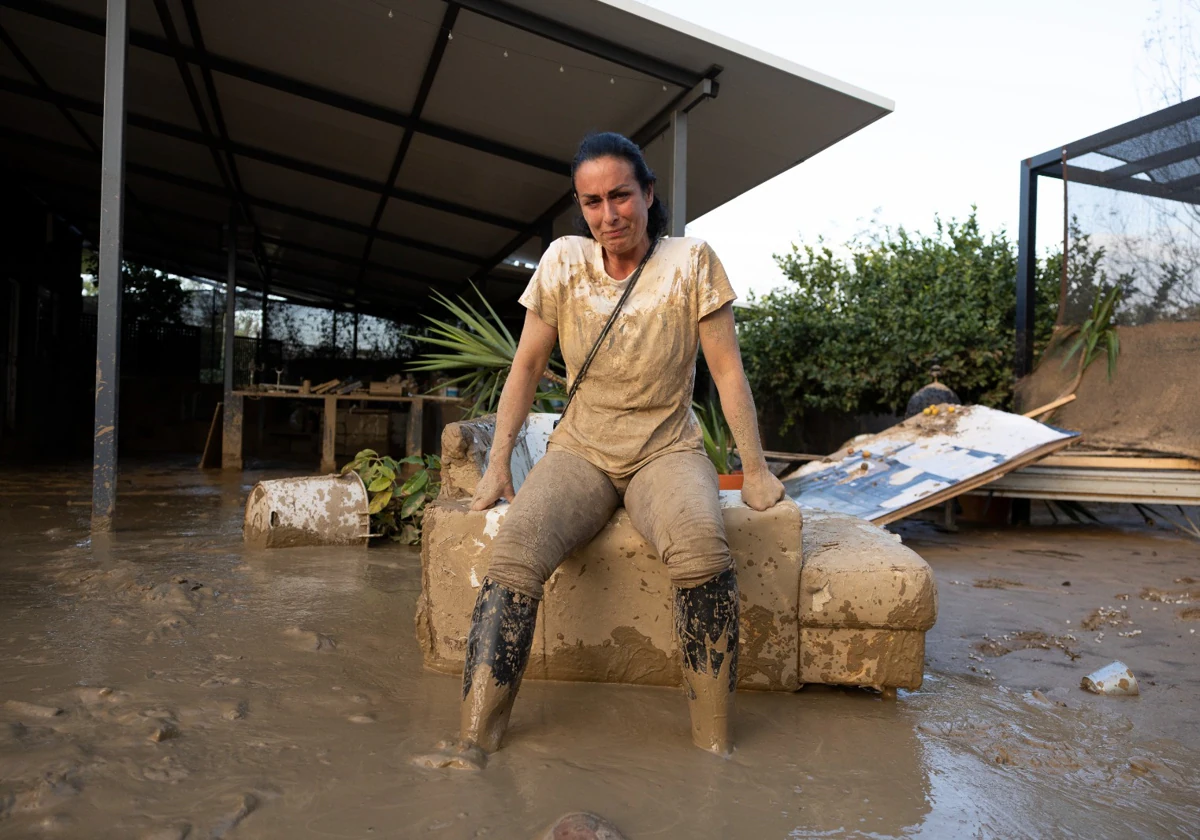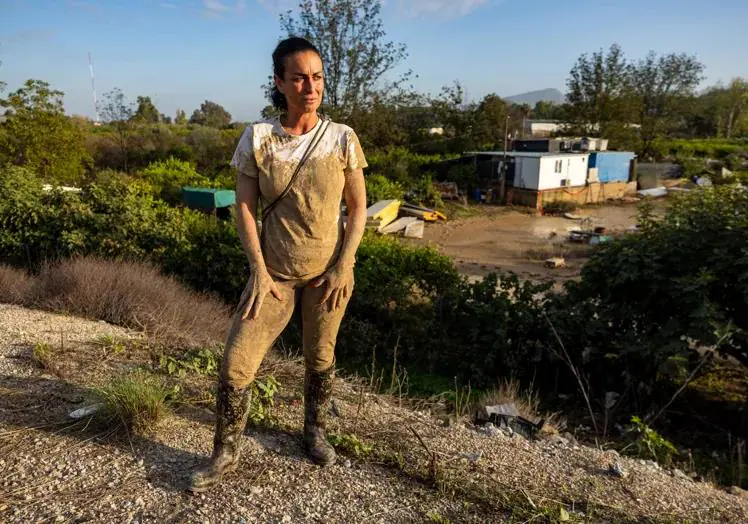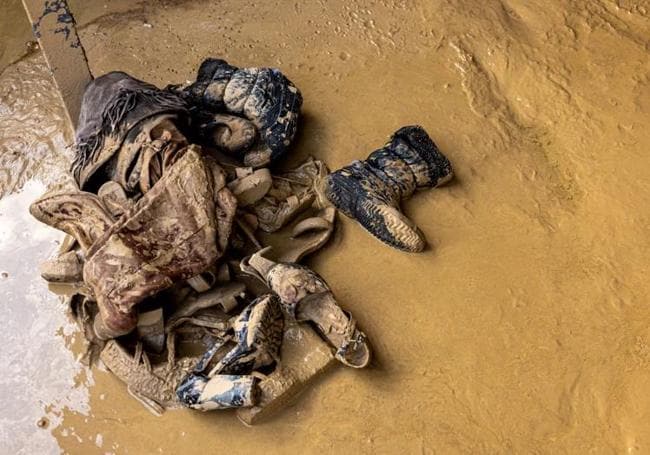

Sections
Highlight

The car park of a petrol station in Cártama appears normal. A man gets out of a hire car and returns with an ice cream for the little girl who remains in the back seat. In the distance, the motorway linkMalaga is full of cars. It's the comings and goings of a working day at three in the afternoon. The sun caresses the cheek and generates a pleasant memory of spring. The intact rhythm of everyday life. But it is not.
First, from a distance, comes a blurry figure walking too close to the crash barrier. This separates a narrow path from the A-357 motorway. Then, there’s the distressing feeling of seeing someone so near to the cars and lorries whizzing past. Next, it's Clotilde de Luque, a 44-year-old woman from Malaga, covered in mud from head to toe, a single mother with a vacant look and dishevelled hair.
It is a story that gets in the pit of your stomach and takes your breath away. The story of a life that has become impossible from one day to the next. It is a mute cry for help from someone who repeats over and over again the following phrase: "I don't want to appear weak." The encounter with Cloti, as everyone calls her, is the result of the serendipity of the moment, different realities that suddenly touch and connect.
On a tour to see the effects that the 'Dana' storm has left on the Guadalhorce, seeing someone covered in mud doesn’t attract much attention. However, it does when a brown crust covers their entire body, as if they've emerged from an extravagant mud therapy session.
After a quick greeting, without needing to ask much, Cloti points to a house situated just below the motorway. "I come from there; that was my home. There's nothing left," she says. "Nothing." Her lips begin to tremble.

The scale of the disaster can be sensed from afar. The roof remains, but the structure looks as if it has been split in two, the result of the tidal wave of water that burst through it last Tuesday. "I didn't sleep a wink all night. With so much lightning it seemed like daytime. In the morning, officials came and gave me half an hour to leave," she says. Just enough time to get her six dogs to safety. "I’ve loved animals since I was young and have always worked with animal shelters. Since I had space, I would always help with temporary foster care," she explains. Her daughter Daniela was at school. "Thank God."
She points once more at the house that is no longer there. The last five years of Cloti’s life have been spent here, in what used to be two floors, a living room, two bedrooms, and an outdoor area decorated as a "chill-out" space. It wasn’t just a home. It was also her resurgence after a divorce. It’s the struggle of a single mother to provide a home for her daughter, even though she didn’t have many resources.
Cloti is nervous. She doesn't want to be pitiful. This is another phrase she repeats several times. She reaches for a pack of Lucky Strike. Cloti says it's her "only vice" and threatens to take out a cigarette. She desists. She tries to speak. The words don't come out. She swallows. "My life changed when I divorced my husband. He is a National Police officer. We lived in Añoreta and I worked part-time. When we separated, my reality changed. I had to look for a house and in Malaga it was impossible. I was earning 1,000 euros. Here I found this opportunity. At one time, this was part of a horse stable. I invested everything I had so that I could have a place for my daughter and opt for shared custody," she says.
Accessing the land where Cloti's house is located is dangerous. It requires walking along the edge of the motorway. The natural entrance is cut off by large stones dragged by the flood. They are the same ones that prevent heavy machinery from entering. You have to go down a steep slope. When you reach the plot, the contrast with everything that reminds you of life is abysmal. If one didn’t know what had happened, it would look like the set of a disaster movie. Branches, useless appliances, and mud—endless amounts of mud—make up a grotesque scene.
Cloti considers herself a warrior. Before the divorce, she had already tasted abandonment: "My mother left my sister and me. I was 15 years old."
She also recently lost her job after 16 years in a large department store. She supplements her 700 euros of unemployment benefit by cleaning here and there, "wherever there is work." But this is another dimension. Cloti sits down on the sofa that used to be in the living room. The mud is a slimy mass that is almost up to her ankles.

For the first time, she feels she has no way out. She spends her nights at her sister's, but without a home of her own she fears losing custody of her daughter. "I haven't slept for a week. I've asked for help but they tell me they can't put machines in here. I have to do it for my daughter," she says. Suddenly, like a pressure cooker calling for release, she begins to cry. It is the cry of a broken person, born of the soul and fuelled by despair. "Where do I go now?" she asks herself.
Personal dramas are diluted in the magnitude of a catastrophe. But this story could help she is told. Cloti sobs and smiles slightly.
Publicidad
Publicidad
Publicidad
Publicidad
Esta funcionalidad es exclusiva para registrados.
Reporta un error en esta noticia

Debido a un error no hemos podido dar de alta tu suscripción.
Por favor, ponte en contacto con Atención al Cliente.

¡Bienvenido a SURINENGLISH!

Tu suscripción con Google se ha realizado correctamente, pero ya tenías otra suscripción activa en SURINENGLISH.
Déjanos tus datos y nos pondremos en contacto contigo para analizar tu caso

¡Tu suscripción con Google se ha realizado correctamente!
La compra se ha asociado al siguiente email
Comentar es una ventaja exclusiva para registrados
¿Ya eres registrado?
Inicia sesiónNecesitas ser suscriptor para poder votar.